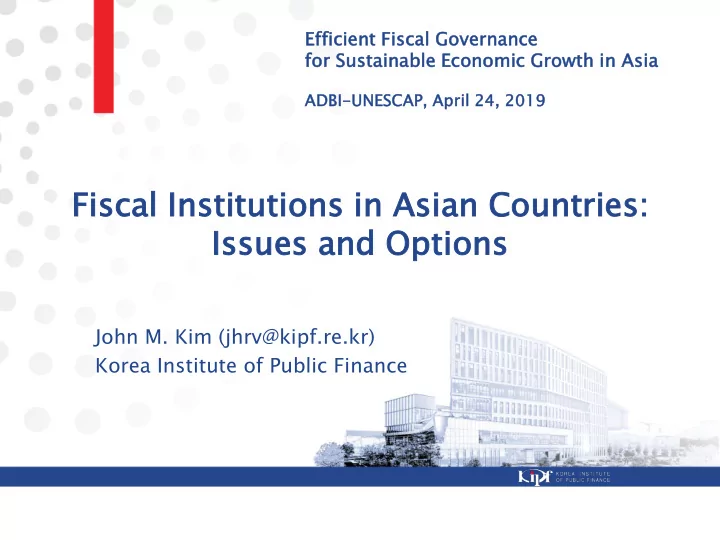

Effici cient Fiscal Govern rnance ance for Sustaina ainable ble Economic ic Growth th in As Asia ADBI-UNESCA ESCAP, April 24, 2019 Fisca cal l Institu titutions tions in Asian Countr untries: ies: Issues es an and Op Options ions John M. Kim (jhrv@kipf.re.kr) Korea Institute of Public Finance
Governance? Institutions? • PFM innovations: S pectrum from speci cific fic & doable to abstra ract/ ct/prob oblem lemati atic c ➢ Enhanced fiscal reporting Transparency, accounting & treasury ➢ Budget process rules Ex ante/post eval., procedures for decisions ➢ MTFFs/MTEFs Longer-term perspective, priorities ➢ Fiscal al Rules Simplification to suppress deficit bias ➢ Fiscal al Counci ncils ? • The ultimate success of any PFM innovation depends on the poli litic ical al will ll to implement it. 2
Governance? Abstract & “problematic”? Probably mainly because of “politics”. • ➢ “Lack of a budgetary theory,” V.O. Key (1940), Amer. Pol. Sci Review 34 ➢ Pigou, Wildavsky , Schick, Rubin …: politics, economics, social, administrative, … ➢ Barbara Neuby, “On the lack of a budgetary theory”, Public Admin. Quarterly, Summer 1996 “ why is there no commonly accepted and debated theory of budgeting? Implicit in the literary debate are several factors inhibiting theory development. There is no consensus as to what budgeting actually is, whether it is a political, economic or social process. There is no agreement on the scope of a budget theory, no agreement upon the dominant methods or techniques of budgeting, disagreement about the approach a budget theory should take, and no agreement about the status of theory itself. ” ➢ Kahn & Hildreth (eds.), Budgetary Theory in the Public Sector, Quorum Books, 2002. 3
Fiscal Institutions (Councils): Why? Fiscal al Rules have to be… (IMF/FAD & EU/OECD) • ➢ Simple (tendency to rigidity) ➢ But, flexible (escape clauses; don’t close all the loopholes) Weaknesses in the fiscal rule approach • 1) Political will: How to make decisions (fiscal rules) se self-bind nding ng? Early examples emphasized “ rule ” (e.g., “Golden Rule”, fiscal balance • “over the cycle”), leaving room for flexibility Lately, we ask whether the rule is “ binding ng ” (as law), and also • favor numerical rules 2) Design issues: flexible/practical vs. simple/rigid ⇨ Better rules (e.g., German Debt Brake) 4
Fiscal Councils: Why? The German Debt Brake tries to make the fiscal rule more practical, • but its motivation also shows the political problem. “Political Will” Problem Technical conformity • with fiscal rule But goes against the • spirit of the rule (political expediency) 5
Fiscal Councils: What is their role? Fiscal al counci ncils can complement ment fiscal al rules to alleviate the political • will problem (difficulty of self-binding decisions) 6
Fiscal Councils: What is their role? With regard to the “political will” problem, the key role of a fiscal • council is to reduce bias by providing a neutra utral (or at least t a t third- party) ) assessmen ment 7
The spread of fiscal councils 8
Limitations? Capacit ity? y? • Staffing, expertise & access to timely information? Neut utral rality? ty? • Many are PBOs (independent? non-partisan?) Mandate? (role in budget process may be more “involved”) 9
Case study) The UK’s OBR 10
Case study) The UK’s OBR 11
Case study) The UK’s OBR 12
Case study) The UK’s OBR 13
Survey of Asian Fiscal Responsibility Laws (PEMNA 2018) Q8: What are the elements of your country's fiscal responsibility arrangements? (Select all that apply) Answered: 9 Skipped: 2 ` 14
Survey of Asian Fiscal Responsibility Laws (PEMNA 2018) Q14: What are the main characteristics of the fiscal council? (Select all that apply) Answered: 5 Skipped: 6 15
Returning to the “self - binding” problem… “Enforcer” Type of fiscal rule Examples = “ Enforcee ”? Supra-national Stability & Growth Pact (EU) No National (Cen. Gov.) Some Asian countries Yes Sub-national Many Asian countries No 16
Fiscal Institutions (Councils) in Asia At the national level, effectiveness of (and need for?) fiscal councils • may still be limited. ➢ Yet they will probably help improve budgetary transparency and policy decisions. ➢ Many governments in the region have, or are in the process of, strengthening fiscal responsibility; often such efforts are centered around MoF or the budgetary authority. ➢ Role for international donors in this regard? For sub-national fiscal responsibility, the central budget authority • (together with other central agencies) can provide important oversight and assistance as “fiscal councils” with respect to SNGs. ➢ Thailand, Malaysia, Indonesia, Myanmar, Philippines, and others 17
Thank you! 18
Recommend
More recommend